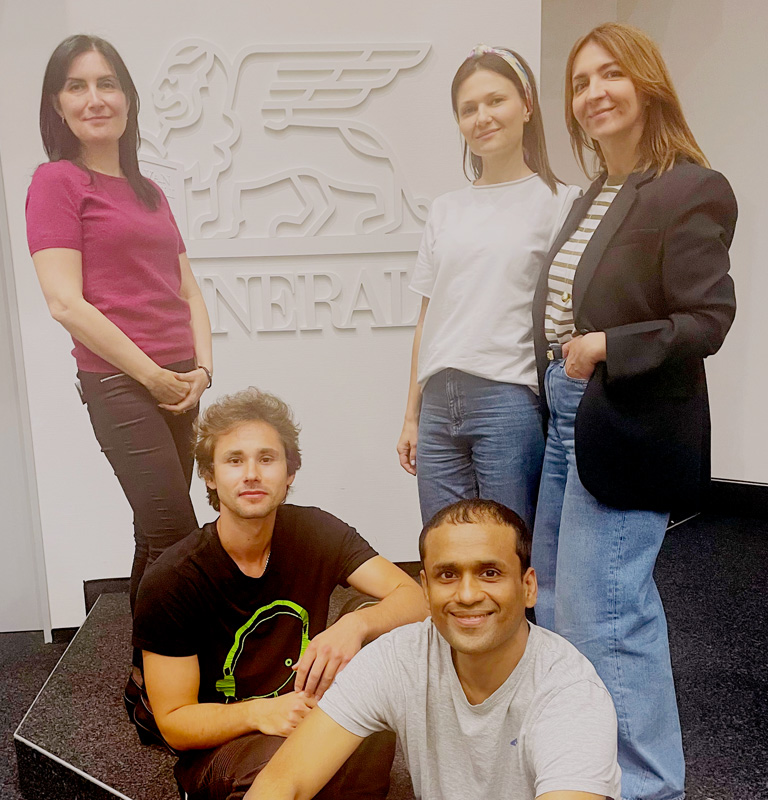The Human Safety Net
Let’s talk about World Refugee Day.
Five refugees tell their stories.
Every year on 20 June, the world celebrates the strength and courage of people forced to flee their homeland. In an interview with our partner Capacity, five refugees talk about finding their feet in Switzerland on a personal and professional level.
What has looking for a job been like in Switzerland?
Azam: It’s not easy. I’ve been looking for a job since October last year, but I haven’t had any luck so far. I have no professional experience in Switzerland, apart from restaurant work, so I’ve been applying for a lot of internships. But I’m not in my 20s anymore, which makes it harder to find an internship or entry-level job.
Tetiana: I haven’t looked for a job in my home country for over 20 years, so it was like I was trying to navigate the Swiss job market in the dark. The Access Fast Track programme was like switching on the light – it showed me clearly what you need to know to find a job in Switzerland.
What’s different about the Swiss job market compared to the labour markets you’re familiar with?
Azam: In the Swiss labour market, more value is placed on experience than on academic qualifications. But where I come from, it’s the exact opposite. References are also really important in Switzerland, which isn’t the case in my country.
Denys: Companies here are looking to forge relationships, not just hire workers. And people stay with the same company for decades. I’ve found that most of the jobs here are very specific. Companies are looking for a certain type of person with a lot of experience in their field.
What important insights did you gain about the Swiss labour market from the Capacity workshops?
Alyona: The Capacity workshops made me realise how important networking is in the Swiss job market, since many vacancies aren’t even advertised.
Denys: It’s probably how modest Swiss people are. That’s what I’ve been told, and I think it’s actually true.
Ella: One of the most important things I learned was how crucial language skills are. In Switzerland, speaking a national language significantly improves your career prospects and means you can integrate into the job market better.
What transferable skills will you take away from the programme?
Ella: I’ve improved my ability to communicate effectively in a multicultural environment and learnt how to build and maintain professional relationships. I’ve also improved my ability to adapt to a new environment and culture.
Alyona: My professional background is in an area that isn’t very in demand in the Swiss market. This has made me realise that I need to rely more on skills like communication, teamwork and problem-solving.
What impact has the Access Fast Track programme had on your professional life – both when you were taking part in the programme and since?
Azam: I think the programme has made it easier for me to understand the Swiss job market, which could make it easier for me to find a job. And it’ll certainly benefit me once I’ve found a job, especially in terms of integrating into the workplace and culture.
Alyona: While I was on the programme, I had a job interview at my dream company, which was a great achievement. I have a better understanding of the local job market and I’ve made some new contacts. The programme has also made me feel more motivated and supported in my job search. This is something that skilled workers with a migration background often lack.
What impact has the Access Fast Track programme had on your personal life – both when you were taking part in the programme and since?
Ella: During the programme, I felt a strong sense of community and support, both from the organisers and the other participants. This helped me to build up a network of friends and professional contacts in Switzerland and was invaluable for my integration. After completing the programme, I feel more confident and empowered to pursue my personal and professional goals.
Tetiana: Participating in the Access Fast Track programme had a profound impact on my personal life, especially my understanding of the Swiss mentality. The interactions within the programme gave me an insight into how immigrants and refugees are viewed in Switzerland. This enabled me to see myself through the eyes of Swiss people.

World Refugee Day
Impact of labour market orientation programme
Our Partner Capacity brings locals and newcomers together, with a focus on collaborative skill-sharing at its centre. With its Entrepreneurship programme and Access programme, the talent and start-up incubator supports people with a refugee or migrant background in Switzerland.

 Contact
Contact
 Find an agency
Find an agency









 Close
Close




